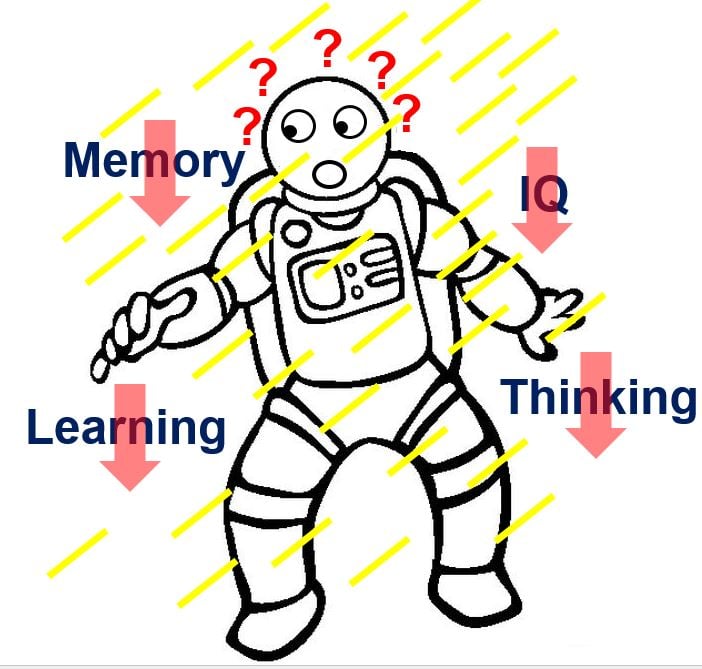Galactic cosmic ray bombardment during the voyage to and from Mars would make the astronauts develop early dementia symptoms, with serious memory loss and cognition deficits, researchers from the University of California, Irvine and the University of Nevada report.
Astronauts at the International Space Station (ISS) are not affected because the spacecraft is in low-Earth orbit and is protected by our planet’s magnetic field.
During the very long voyage to and from Mars, however, there is no protection, the scientists explained in the journal Science Advances.

If cosmic rays (yellow lines) caused dementia symptoms, how would the astronauts be able to complete the mission?
Animal studies showed that astronauts’ brains would probably be seriously damaged by destructive particles that would go right through the spacecraft and permanently impair cognition, i.e. detrimentally affect their ability to think, learn, remember, and make decisions properly.
Professor Charles Limoli, a specialist in radiation oncology who works at the Cancer Research Institute, part of the University of California, Irvine, and fellow experts discovered in animal studies using mice that exposure to highly energetic charged particles – similar to the ones that would hit the brains of Mars astronauts – caused significant damage to the CNS (central nervous system), leading to cognitive deficits.
According to Prof. Limoli:
“This is not positive news for astronauts deployed on a two- to three-year round trip to Mars.”
“Performance decrements, memory deficits, and loss of awareness and focus during spaceflight may affect mission-critical activities, and exposure to these particles may have long-term adverse consequences to cognition throughout life.”
Animal study does not bode well
The researchers exposed laboratory mice to doses of fully ionized titanium and oxygen (charged particle irradiation) at NASA’s Space Radiation Laboratory, part of the Brookhaven National Laboratory.
The team then studied the mice at Prof. Limoli’s Irvine lab and found that being exposed to these particles led to brain inflammation. The animals’ nervous systems had been damaged – transmission of signals between neurons (brain cells) was disrupted.
Imaging studies showed that their brains’ communication networks had been damaged through reductions in the structure of nerve cells, specifically dendrites and spines.
Alterations to synapses as well as other structural changes had considerably undermined the nerve cells’ ability to properly transmit electrochemical signals, the authors wrote.
Poorer memory and learning ability
After being exposed to particle irradiation, the mice’s performance in memory and learning tests declined significantly.
Prof. Limoli and team said they had previously observed similar types of severe cognitive deficits in brain cancer patients who had received several photon-based, high-dose radiation treatments.
Many of these symptoms would take several months to appear in a space mission. However, as the authors pointed out, the trip to and from the Red Planet would be a long one, during which the cognitive deficits would emerge.
The concern is not only for the physical and mental health of the astronauts, but also the success of the mission. If the astronauts cannot think properly, the risk of serious mistakes being made during the voyage must be considered.
Can anything be done to reduce the risk?
Adding extra shielding to some parts of the spacecraft, perhaps where the astronauts sleep and rest, could help reduce the levels of exposure to cosmic rays, the authors wrote.
However, there is no way of blocking all the rays. “There is really no escaping them,” the researchers said.
Prof. Limoli said:
“We are working on pharmacologic strategies involving compounds that scavenge free radicals and protect neurotransmission. But these remain to be optimized and are under development.”
In the journal, the authors concluded:
“Our data indicate an unexpected and unique susceptibility of the central nervous system to space radiation exposure, and argue that the underlying radiation sensitivity of delicate neuronal structure may well predispose astronauts to unintended mission-critical performance decrements and/or longer-term neurocognitive sequelae.”
Video – Cosmic rays and brain damage
Professor Limoli explains how long-term cosmic ray exposure can lead to dementia-like symptoms.

